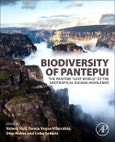Biodiversity of Pantepui: The Pristine "Lost World" of the Neotropical Guiana Highlands provides the most updated and comprehensive knowledge on the biota, origin, and evolution of the Pantepui biogeographical province. It synthesizes historical information and recent discoveries, covering the main biogeographic patterns, evolutionary trends, and conservational efforts.
Written by international experts on the biodiversity of this pristine land, this book explores what makes Pantepui a unique natural laboratory to study the origin and evolution of Neotropical biodiversity under the influence of only natural drivers. It discusses the organisms living in Pentepui, including algae, plants, several groups of invertebrates, birds, amphibians, reptiles, and mammals. The latter portion of the book delves into the effects of human activity and global warming on Pantepui, and current conservational efforts to combat these threats. Biodiversity of Pantepui is an important resource for researchers in ecology, biogeography, evolution, and conservation, who want to understand the biodiversity and natural history of this region, and how to help conserve and protect the Guiana Highlands from environmental and human damages.
Please Note: This is an On Demand product, delivery may take up to 11 working days after payment has been received.
Table of Contents
1. Physiographical and environmental diversity2. Holocene climatic and ecological history
3. Protista: cyanobacteria, green algae, diatoms
4. Bryophyta
5. Vascular plant diversity and phytogeography
6. Elevational plant diversity patterns
7. Plant phylogeography and evolution
8. Vegetation and ecosystems
9. Invertebrates: insects, scorpions, crabs, snails, vertebrate parasites
10. Amphibians and reptiles
11. Birds
12. Mammals
13. Threats and conservation status
14. Potential effects of global warming








